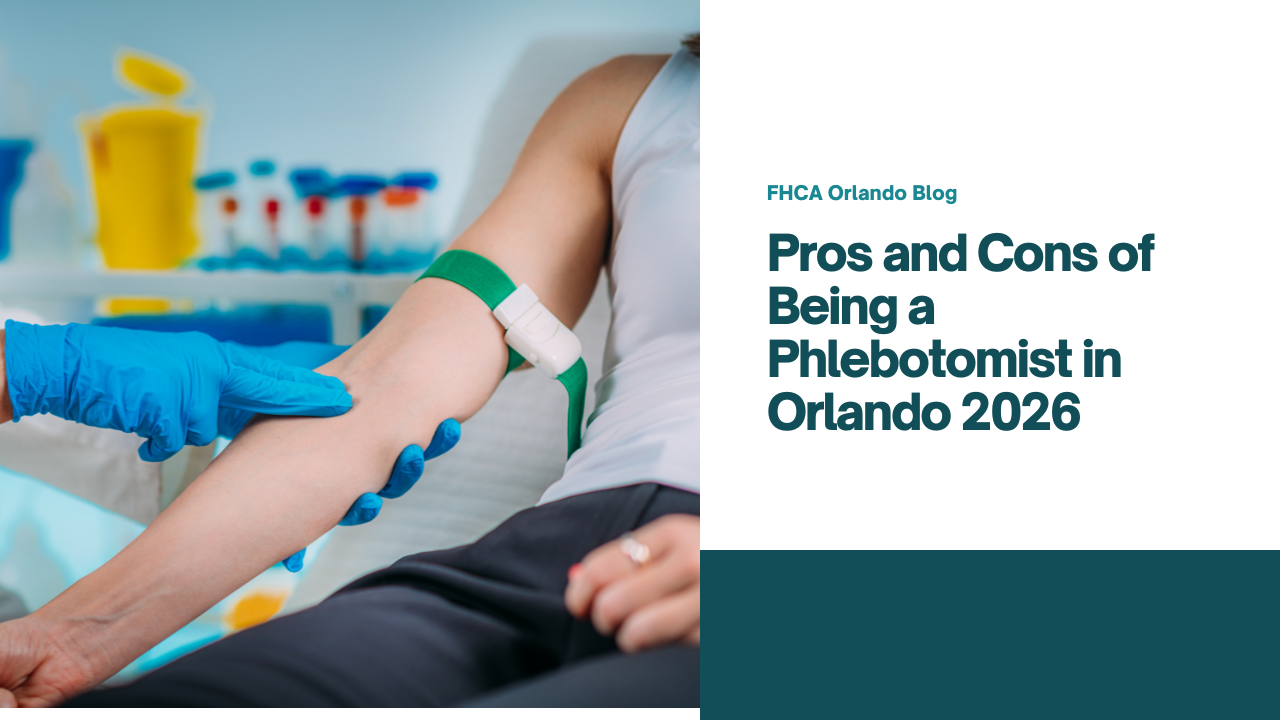Phlebotomist Job Description in Orlando 2026
Nov 26, 2025
Being a phlebotomist involves more than drawing blood. It's a key healthcare role that requires confidence, care, and precision. In a fast-paced city like Orlando, phlebotomists are essential to supporting accurate diagnostics and improving patient care. If you're considering this path, the phlebotomy program Orlando offered by FHCA Orlando gives you the practical skills and real-world training you need to succeed.
Table of Contents
- Phlebotomist responsibilities in Orlando
- Key skills for a phlebotomist in 2026
- Work settings for phlebotomists in Orlando
- Phlebotomy career opportunities and areas of focus
- How to become a phlebotomist in Orlando
- Phlebotomist job description in Orlando 2026 FAQs
- Get started with phlebotomy training at FHCA Orlando
Phlebotomist responsibilities in Orlando
In 2026, the role of a phlebotomist remains vital in clinics, hospitals, and labs. You are the connection between the patient and the test results. Your responsibility is not only to collect blood samples but also to ensure safety and accuracy throughout the process.
Some professionals in this role also expand their duties by becoming a phlebotomy technician, especially in more complex lab environments.
Blood collection and specimen prep
Your core task is to perform venipuncture or capillary blood draws. You’ll prepare and label samples correctly, maintain clean work areas, and follow strict protocols for handling biological materials. These steps are critical for lab accuracy.
Patient ID and safety in phlebotomy
Before every draw, you confirm the patient’s identity, verify the order, and ensure a calm, safe experience. Following sanitation and personal protection standards protects both you and the patient.
Key skills for a phlebotomist in 2026
Employers want phlebotomists who are calm under pressure, great communicators, and extremely detail-oriented. These are skills that go beyond technique and are often the difference between a good and a great healthcare professional.
Communication and empathy in phlebotomy care
You’ll work with patients who may be afraid of needles or unsure of the process. Calm, clear explanations and an empathetic tone go a long way in building trust and keeping procedures smooth.
Focus, dexterity, and precision for phlebotomists
Phlebotomy requires excellent hand coordination and mental focus. A single misstep in labeling or handling could affect patient results.
Phlebotomy knowledge and understanding of lab procedures
You’re not just drawing blood. You’re also preparing samples for lab testing, which means following specific guidelines for storage, transportation, and data entry.
These are part of what you’ll practice during training and what we cover in depth in our phlebotomy tips.
Work settings for phlebotomists in Orlando
Orlando offers a range of healthcare facilities, giving phlebotomists many options for employment. Your work environment can shape your routine, responsibilities, and the pace of your day.
Common work environments for phlebotomists in Orlando
Phlebotomists in Orlando can work in hospitals, diagnostic labs, outpatient clinics, long-term care facilities, and mobile blood banks. These settings offer different workflows and patient populations.
What to expect when working in each healthcare setting
In hospitals, expect variety and urgency. Labs focus more on processing accuracy. Mobile units require flexibility and strong interpersonal skills. Choosing your work environment depends on your career goals and personal strengths.
Awareness that phlebotomists in high demand are needed in multiple settings can help guide your career choices and preparation.
Phlebotomy career opportunities and areas of focus
This role offers a clear path for growth. You may specialize in pediatric or geriatric phlebotomy, or move into supervisory roles. Some professionals become lab assistants or take on expanded duties as they gain clinical experience.
Compensation in these roles can vary, and current trends are outlined in this breakdown of phlebotomist salary Florida.
Phlebotomy is also a great starting point if you’re considering a broader career in healthcare. Many professionals begin here and move on to nursing or lab technology. For insight into the career benefits, explore the benefits of being a phlebotomist.
How to become a phlebotomist in Orlando
Choosing the right training is the most important step in starting your phlebotomy career. Orlando is a competitive market, and formal training gives you an edge. Before enrolling, make sure you know how much phlebotomist classes cost so you can plan your investment wisely.
Training and education requirements
To become a phlebotomist, you need to complete a certified training program. At FHCA Orlando, you’ll receive hands-on training, classroom instruction, and the opportunity to work with real equipment.
This experience prepares you to perform confidently from day one.
Certification options for future phlebotomists
After completing your training, you can pursue national certification through recognized agencies. This is often required by employers and helps you stand out in the job market.
Certification proves you’re ready to apply what you’ve learned in high-pressure environments.
Phlebotomist job description in Orlando 2026 FAQs
If you’re planning to become a phlebotomist in Orlando, these common questions will help clarify what the role involves, what employers expect, and how to get started.
What qualifications do I need to become a phlebotomist?
You’ll need a high school diploma or equivalent and must complete a formal training program. Certification is usually required for hire.
How long does phlebotomist training or certification take?
Programs vary, but most take a few months. Once completed, you can schedule your certification exam.
What is the average salary of a phlebotomist in Orlando?
The average wage varies based on experience and location, but Orlando offers competitive salaries for entry-level and experienced phlebotomists.
What is the difference between a phlebotomist and a lab technician?
Phlebotomists draw blood and interact directly with patients. Lab technicians typically work behind the scenes analyzing specimens.
Get started with phlebotomy training at FHCA Orlando
Phlebotomy is a fast-growing healthcare field where you can make a difference every day. Whether you want to start working quickly or use this role as a stepping stone to more advanced careers, training at FHCA Orlando sets you on the right path.
Join our phlebotomy program Orlando trusted by students across Central Florida. With real-world practice, experienced instructors, and support from enrollment to graduation, you're fully prepared for a career that matters.
Complete your Enrollment today and take the first step toward becoming a certified phlebotomist.










